From 2014, a few of our favorite things
Posted on: December 19, 2014; Updated on: December 19, 2014
As 2014 comes to a close, these are some of our favorite Carolina stories of the year.
Outstanding faculty
Faculty members at Carolina have a keen interest in helping their students succeed
and creating new knowledge through leading-edge research. Their passion for top-notch
teaching and scholarly excellence are the hallmarks of a Carolina education.
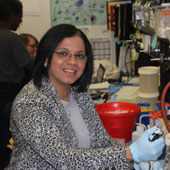
If you've ever worked on a 500-piece jigsaw puzzle, you know the frustration of putting
it together, one piece at a time, as the big picture slowly takes shape. Rekha Patel likens her teaching style to coaching those who are assembling a puzzle — in this
case, the big picture of biochemistry.
Research funding and sponsored awards at Carolina have been trending upward consistently for more than a decade. The trend continued
in fiscal year 2014, with the university bringing in $230.2 million in research awards
— a 4.5 percent increase over the previous year.
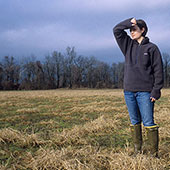
Kathleen Robbins, professor of photography, is documenting changes taking place in
the Mississippi Delta, once dubbed the “Land of Cotton.” The region’s fluffy bolls
are being replaced by corn and soybeans and the lifestyle associated with the former
"king" crop is disappearing.
Growing collections
It was a big year for the university’s libraries, which expanded prized collections
by capturing some big names.
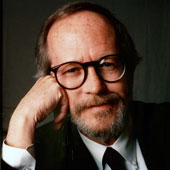
Elmore Leonard spent more than six decades writing – from 1950s Westerns to gritty
crime novels to screenplays for popular movies. And the life’s work of the man known
as the master of American crime fiction now belongs to the University of South Carolina
Libraries.

In the early 1970s, Pat Conroy took a poetry class with James Dickey at UofSC. The notebook the budding author used
for that class is now back at the university as part of Conroy's archive that will
be housed alongside collections of Ernest Hemingway and F. Scott Fitzgerald.
Scholarly students
Our students come here with big questions and even bigger opportunities to explore
and find answers. From award-winning academic programs to beyond-the-classroom experiences,
Carolina gives them the tools to succeed long after graduation.
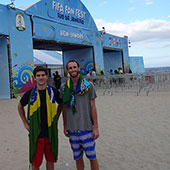
This summer, Brazil was at the center of the world's attention as the best soccer
players from across the globe competed for the ultimate trophy. Amidst the fans and
excitement, the cheers and the tears, two students reached the pinnacle of their college
experience at this year's World Cup.

Doctoral candidate and Upward Bound instructor Brittany Garvin brings science to life
for low-income and marginalized youth through hands-on classroom activities and experiments.

Davontae Singleton's rocky road in middle school inspired his drive to become an educator
for at-risk students.
Successful graduates
When our graduates go out to make their way in the world, they find ways to contribute
almost immediately and make a splash.
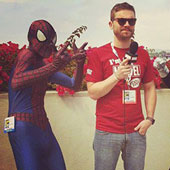
When comic book fans took over part of San Diego for the annual Comic-Con International, one alumnus brought it to the masses. That's because Blake Garris works for Marvel Comics, running parts of the comic company's website, including live streaming and creating
videos from the famous comic convention.
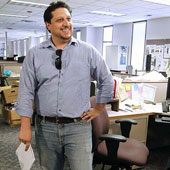
Alumnus and current Tampa Bay Times reporter Michael LaForgia and fellow reporter
Will Hobson won the 2014 Pulitzer Prize for local reporting in April. Their series
of articles about Tampa-area slumlords who took advantage of a dysfunctional public
agency while providing the homeless with substandard housing led to the agency's closure.

When faced with the loss of her vision, Wendy Bryan had to find a new path to continue
doing the social work that she loved. After finding a lack of ways to connect with
other people with disabilities, she decided to create a statewide network called Disability
Connections. With the help of technology, friends and family Bryan is able to run
the nonprofit organization herself.
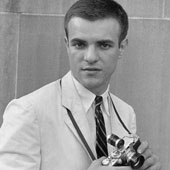
Constantine Manos has always been a little ahead of his time, from having a professional
photography gig by the time he finished his first year at Carolina to opposing segregation
in editorials written in 1953-54 for The Gamecock.
Moving forward
At Carolina, we’re continuously looking for new opportunities that will enhance education,
help our students succeed and conduct relevant, world-changing research.

It’s now official: IBM — one of the largest and most respected technology companies
in the world — is partnering with UofSC and will take up residence on the Columbia
campus.

With the ringing of a bell, Darla Moore officially opened the new building bearing
her name and ushered in a new era for the university's business school. Moore told
the audience at the grand opening event that the building represents her expectations
for the school's future: excellence.

More than 400 law alumni, faculty and students gathered to celebrate the ground breaking
of a new home for the University of South Carolina's School of Law that will open
in 2017 during the school's 150 anniversary year.
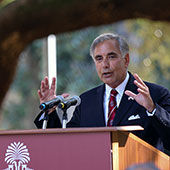
President Harris Pastides told students, faculty and staff about initiatives for accelerated degree programs,
which increase affordability and accessibility to a college education. Pastides also
discussed the university's progress on its aggressive $1 billion Carolina's Promise fundraising campaign, wrapping up the faculty replenishment program and looking forward
to improved economic enterprise opportunities through the USC/Columbia Technology
Incubator.
Staff making a difference
The staff at UofSC impacts the lives of our students and faculty daily. Their expertise
and helpful assistance are what make the Carolina experience special.
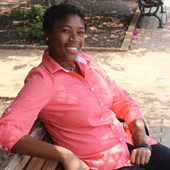
You might not notice, but Aisha Haynes stutters. And she doesn't mind telling you
so. After all, stuttering has helped shape who she is today, not just personally but
professionally.
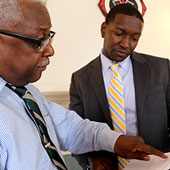
The Carolina community prides itself on being a family. For Christopher Gallman, it
really is. Gallman, a 2008 graduate from the Darla Moore School of Business, is following
in his dad’s footsteps by working at the university’s law enforcement division, something
he first stumbled on as a student.
Getting scientific
UofSC researchers pushed boundaries all over the scientific map in 2014. They reinvigorated
penicillin against resistant microbes, used particle accelerators to better understand
medieval English history and uncover evidence of the Higgs boson, freeze-dried dust
mites and allergens to combat asthma, looked at the past and into the future of the
world’s oceans, discovered a rare new plant species that inhabits South Carolina alone
and are looking closely at Mars in the search for extraterrestrial life. And that’s
just an abbreviated list.
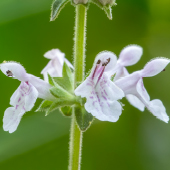
The exclusive club of explorers who have discovered a rare new species of life isn’t
restricted to globetrotters traveling to remote locations like the Amazon rain forests,
Madagascar or the woodlands of the Congo River basin. Just ask professor John Nelson
and alumnus Douglas Rayner — they’re having their membership cards stamped with a
long-hidden plant found nowhere but South Carolina.
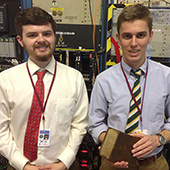
A case of medieval identity theft might have allowed an unusually rare Pocket Bible
from the 13th century to find a home at the University of South Carolina. If researchers
can establish that the hand-lettered book was once part of the holdings of a pre-Reformation
English monastery or friary, they'll bring to light a truth hidden nearly 500 years
ago.
Find all of our stories from 2014 in our archives
Share this Story! Let friends in your social network know what you are reading about


















